Guam Congressional Representation Act 1972
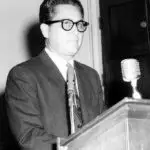
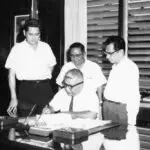
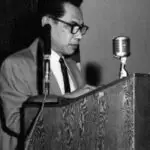
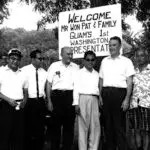
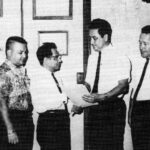
Table of Contents
Share This
Places Guam representative in the House
On 10 April 1972, Public Law 92-271 was passed by the United States Congress, establishing the offices of Delegate of the Territories of Guam and the Virgin Islands. The groundbreaking law finally gave Guam and the Virgin Islands representation in Congress for two-year terms. Elected officials could now speak on the House floor and introduce new legislation though they could not vote on the floor. On 3 January 1973, Antonio B. Won Pat became the first resident of Guam to take the oath of office as a member of the 93rd Congress.
Non-voting delegate
Part of understanding Guam’s efforts to obtain representation in Washington includes understanding the parameters of representation as stated in the US Constitution. Article I of the US Constitution lays the foundation for the creation and powers of the US bicameral (two chamber) legislative body consisting of the House of Representatives and the Senate.
All legislative Powers herein [the Constitution of the United States] granted shall be vested in a Congress of the United States, which shall consist of a Senate and House of Representatives…
The House of Representatives shall be composed of Members chosen every second Year by the People of the several States, and the Electors in each State shall have the Qualifications requisite for Electors of the most numerous Branch of the State Legislature…
The Senate of the United States shall be composed of two Senators from each State, chosen by the Legislature thereof, for six years; and each Senator shall have one Vote.
The Constitution of the United States is specific and clear that the composition of the members of the House of Representatives and senators of the Senate can only come from its States of the Union. All other possessions of the United States, such as Guam and even the District of Columbia, for that matter, do not have House Representatives and Senators in Congress. Instead, Guam has a “Delegate” in the House of Representatives with very limited privileges prescribed by law and House rules.
The genesis of delegates to Congress from US territories is derived from the Northwest Ordinance of 1787 passed under the Congress of the Confederation—a time that predates the Constitution and when Congress was a unicameral or one-house legislature. This ordinance created and authorized a territorial legislature to “elect a delegate to Congress, who shall have a seat in Congress, with a right of debating, but not of voting, during this temporary government.” From that ordinance came a House Resolution, and then through subsequent congressional legislation, delegates were granted certain privileges within the House of Representatives.
Voting privileges, not voting rights
While it is generally accepted that the Constitution does not grant a delegate to Washington a right to vote on final legislative measures within the House as a whole, the voting privilege is contingent upon the House rules of a given Congress. For instance, in the 103rd Congress, the House approved a rule change, which extended the vote in a Committee of the Whole (i.e., the entire House of Representatives acting as one large congressional committee) to all House delegates. This rule was challenged as unconstitutional but failed, and the delegate vote was upheld by the US District Court for the Columbia District.
However, there was one additional caveat to this House rule change: if a vote of the Committee of the Whole was decided by a margin of the delegates’ votes, a re-vote within the House would take place without the delegates’ vote. When the succeeding 104th Congress convened the House rule change was reversed and the delegates to Congress lost their voting privileges.
Given the current parameters of the US Constitution, there are at least two ways that Guam can potentially have voting representation in the US House of Representatives and Senate: through an amendment to the US Constitution; or if Guam legitimately becomes a State of the Union.
Pre-delegate period
Not long after the 1898 cessation of Puerto Rico, Philippines and Guam from Spain to the US, the US was not as responsive to Guam as it was to granting Puerto Rico and the Philippines some form of representation in Congress. In 1902, Congress granted Puerto Rico and the Philippines “Resident Commissioners.” They were a new form of territorial representatives to the US and, at the time, with substantially less privileges than those given to the House Delegates from Alaska and Hawaii. But for Guam, up until 1964, the only representation it had with Washington was a presidentially-appointed governor.
Although the 1950 Organic Act was a major milestone granting US citizenship and developing Guam’s governance, the US still did not provide Guam with any formal type of congressional representation. For the next 22 years, Guam pushed forward to work the legal and bureaucratic system to try and create a representative for Guam in Washington. Several petitions were sent through the Department of Interior to authorize a delegate to Congress, but were repeatedly shot down.
In 1954, hearings were held on Guam by a special congressional subcommittee surveying federal statutes. Guam representatives raised the representation issue, and it was Carlos P. Taitano who testified:
Mr. Chairman and members of the committee, the subject or this part of our discussion is Washington representation for the people of Guam. The type of representation that we are asking is similar to that extended to the people of Alaska, Puerto Rico, and Hawaii. They are able to present bills on behalf of their people and are able to speak before that body. We feel that at this time such representation is adequate for us. What are we after in making this request? We want direct representation within the Federal Congress…[We] feel that this is a fundamental right of all the citizens of this great Nation…We feel that we are entitled to similar representation which will keep us in close contact with the rest of the Nation. This remoteness from the mainland separates us from the rest of the Nation…Our views are not heard. We are not given the opportunity of expressing our views before the legislative body that enacts laws governing our territory. Unfortunately, persons in Washington and the rest of the Nation know very little about Guam…We feel that we are left out of the country.
Because of the strategic importance of Guam, the military has tremendous authority over our way of life. It is highly important that the military be given that authority but we must be sure that we are not depriving our people of their rights as American citizens.
In 1961, President Dwight D. Eisenhower included in his 1961 budget request some funds to pay for a Guam delegate in Congress. In addition, several pieces of legislation in the House and Senate were introduced but remained unsuccessful in Congress. Up until this point there were at least two key concerns that lingered throughout Washington for not granting a Guam delegate: first, funding the position; and second, it was also clear that certain national leaders were apprehensive and did not want to convey the impression that by granting a delegate, they would be changing Guam’s status from unincorporated to an incorporated territory and a promise of Statehood.
Impetus for success
By 1964, Guam developed another strategy. Democratic Floor Leader Ricardo J. Bordallo of the 7th Guam Legislature introduced a bill to create an elected representative position to serve a four-year term in Washington. Bordallo was successful with his proposal and his bill became Guam Public Law 7-163. Coincidentally, the Honorable Antonio B. Won Pat was also the Speaker of the 7th Guam Legislature.
The first election was a special election for the position and held in March 1965. Won Pat narrowly beat his opponent, Felix L. Crisostomo from the Territorial Party, by a margin of 297 votes and became Guam’s first elected representative in Washington. However, because it was only a Guam law that created that position, Congress did not fund the position and the position did not have any official standing with Congress.
While Won Pat was in Washington as Guam’s elected representative, he established Guam’s presence and began developing his rapport and network with the executive and legislative branches of the US government. He testified at many congressional hearings and lobbied heavily for the Guam Elective Governor bill, which finally passed in 1968. Guam’s methodical strategy of representation, coupled with Won Pat’s hard work in Washington, was viewed successful enough for the US Virgin Islands and American Samoa to emulate. Upon the arrival of the US Virgin Island’s delegate Ron de Lugo, both he and Won Pat began to lobby heavily for non-voting delegate representation.
Finally in 1972, Won Pat and de Lugo’s efforts paid off and Public Law 92-271 was enacted granting Guam and the Virgin Islands one Delegate seat each in the House of Representatives. The first election for the Guam Delegate position was held in November 1972. Won Pat won the election over Guam Senator Pedro D. Perez and became Guam’s first elected Delegate to Washington.
Guam delegates: past and present
Since the 93rd Congress, Guam’s House of Representatives delegate is chosen by election and serves for a term of two years. The following is a list of delegates that were elected to represent Guam’s interest in Washington:
- Antonio “Tony” B. Won Pat (1973-1984)
- Vicente “Ben” G. Blaz (1985-1992)
- Robert A. Underwood (1993-2002)
- Madeleine Z. Bordallo (2003-2018)
- Michael San Nicolas (2019-2023)
- James C. Moylan (2023-Present)
For further reading
Carano, Paul, and Pedro C. Sanchez. A Complete History of Guam. Rutland: Charles E. Tuttle, Co., 1964.
Leibowitz, Arnold H. Defining Status: A Comprehensive Analysis of United States Territorial Relation. Leiden: Martinus Nijhoff, 1989.
Rogers, Robert. Destiny’s Landfall: A History of Guam. Honolulu: University of Hawai’i Press, 1995.
Sanchez, Pedro C. Guahan Guam: The History of Our Island. Hagåtña: Sanchez Publishing House, 1987.
US Library of Congress. Congressional Research Service. District of Columbia Delegates to Congress, by Michael K. Fauntroy. RS208785. 2001.
––– Congressional Research Service. Delegates to the U.S. Congress: History and Current Status, by Betsy Palmer. R40555. 2022.
